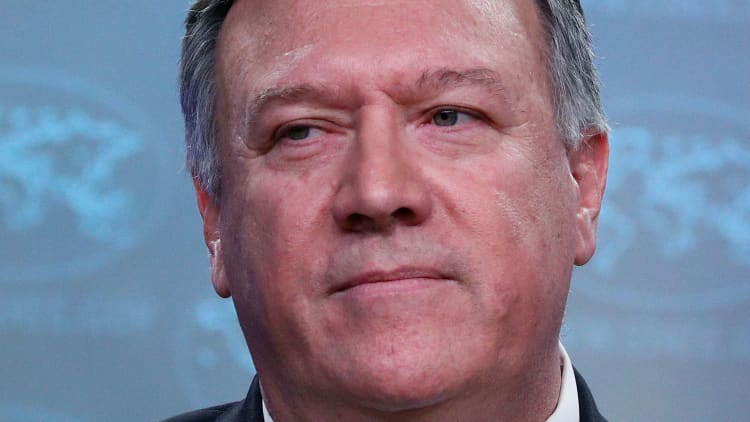The U.S. has no plans to target Iranian cultural sites in potential strikes, Pentagon chiefs told reporters, despite threats from President Donald Trump issued after Iran vowed retaliation for the U.S. killing of its top general, Qasem Soleimani.
Asked during a press gaggle if the U.S. military would follow Trump's announced plan to target cultural sites in Iran, Joint Chiefs of Staff Chairman Gen. Mark Milley replied, "We will follow the laws of armed conflict."
Asked if that meant "no" because targeting cultural sites constitutes a war crime under those laws, the general replied, "That's the laws of armed conflict."

Trump on Sunday vowed to hit 52 targets in Iran "very hard" if the country retaliates for the assassinating Soleimani in drone strike in Baghdad on Friday (late Thursday ET). Soleimani was head of the Islamic Revolutionary Guard Corps' external wing, the elite Quds Force and was considered the second-most powerful leader in Iran, credited with expanding Iran's influence through proxy networks all over the Middle East.
The laws of armed conflict represent a branch of international law that governs relationships between states and is meant to regulate armed conflict.
Trump tweeted Sunday that Iran "is talking very boldly about targeting certain USA assets" in response to Soleimani's death, and said that the U.S. had "targeted 52 Iranian sites," some of which were "at a very high level & important to Iran & the Iranian culture, and those targets, and Iran itself, WILL BE HIT VERY FAST AND VERY HARD."
Trump did not specify what the sites were, but said that the number chosen was meant to represent the 52 American hostages held by the Islamic Republic for 444 days after the seizure of the U.S. embassy in Tehran in 1979.
Michael Knights, a Gulf and security expert at the Washington Institute, wrote on Twitter on Sunday that "there would not be 'cultural' targets on any U.S. target list. Such sites are on a 'no-strike list' and/or a 'restricted target list' including all UNESCO sites and many others, incl mosques, schools, etc."
US raises alert as Iranian mourners vow revenge
Millions of people have poured into the streets of Iran and Iraq for three days of mourning led by Iranian Supreme Leader Ayatollah Ali Khamenei, who has vowed "harsh revenge" against the "criminals" who carried out the strike.
Iran's Supreme National Security Council secretary on Tuesday announced "13 revenge scenarios," against the U.S., warning that "even if there is consensus on the weakest scenario, carrying it out can be a historic nightmare for the Americans."

The U.S. Department of Homeland Security warned Tuesday of potentially lethal responses from Iran, including cyberattacks on the U.S. homeland and proxy attacks in Middle Eastern countries where U.S. troops are operating.
Washington has called on all U.S. citizens in Iraq to leave the country immediately, and is sending 3,500 additional troops to the region.
Soleimani's killing follows U.S. airstrikes in Iraq last week that killed 25 members of Kataeb Hezbollah, an Iranian-backed Iraqi Shiite paramilitary group responsible for rocket attacks that killed a U.S. contractor and other U.S. allies in northern Iraq in late December. The past week saw members of that militant group and others attack the U.S. embassy in Baghdad, many of whom chanted "Qasem Soleimani is our leader."
The killing marks a dramatic escalation in the brewing standoff between Iran and the U.S. that's been building since Washington withdrew from the Iranian nuclear deal in 2018 and has intensified in the last year with attacks on commercial tankers and oil facilities widely blamed on Iran.
The last year also saw Washington's designation of the Revolutionary Guard Corps as a terrorist group, Iran's shooting down of a U.S. drone, intensifying U.S. sanctions on Iran, and Tehran's incremental rolling back of its commitments to the nuclear deal.


